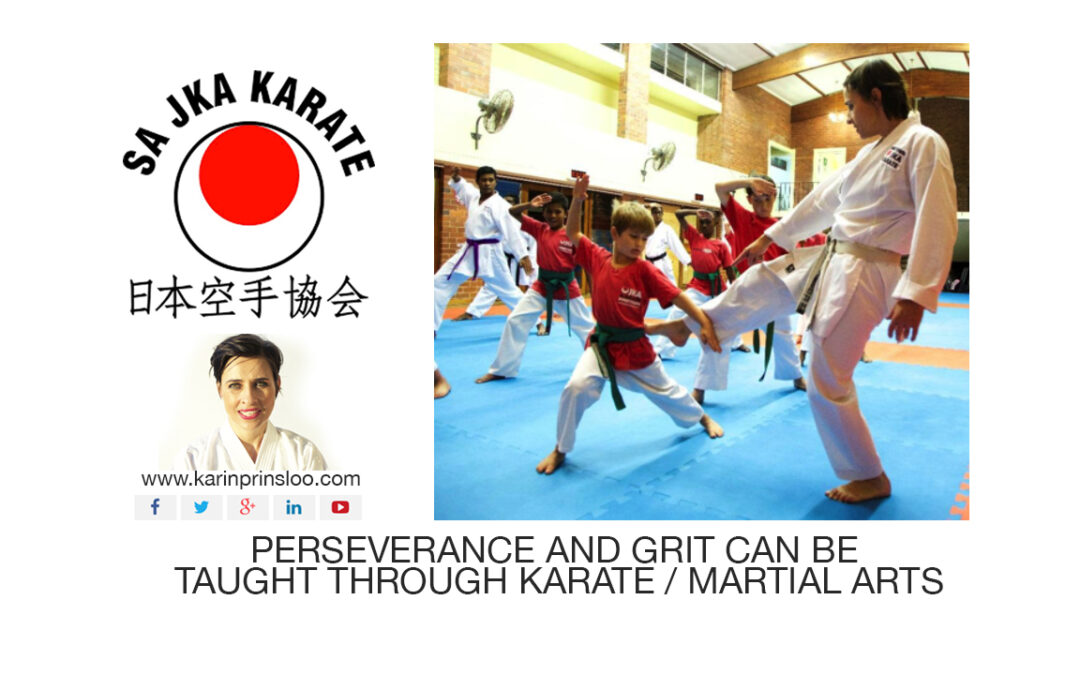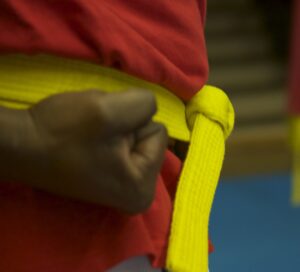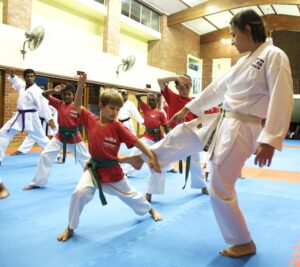 Thank you to Karate for teaching us Perseverance and Grit!
Thank you to Karate for teaching us Perseverance and Grit!
I recently read an interesting article from Master Bronson Ko from Kansas,
“When should we allow our children to quit”. I decided to write this article based on my own teaching experience.
When is it acceptable for our children to quit? Start with the question: ‘In order to be the best person your child can be, what is the most important life lessons and life skills they need to learn?’
Some life skills include: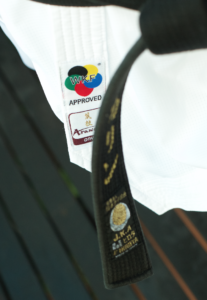
- To be happy and confident
- Delayed gratification
- Effort vs reward
- Consequence to behaviour
- Etiquette, respectful and ethical conduct
- Grit, perseverance
- Intellect, concentration skills
- Social skills
- Physical fitness
- Character, integrity
Our children live in a virtual world.
Our children live in a virtual world, some are even virtual addicts, e.g. constant use of computer games leads to instant gratification and no real consequence for decisions, or are there? Too much social media prevents our children from developing social skills and meaningful relationships – relationships not only with humans, but also the non-human world. It is easier to ‘close the app’, ‘leave the group’ or ‘unfriend’ rather than dealing with conflict or resolving a situation. Being young and easily influenced, our children may portray themselves as someone/thing they are not, thus not being true to themselves and others. A young person will not learn to be confident in who they really are if they constantly (have to) pretend. Once grown up, in the real world, your skills set will determine your success, or lack thereof.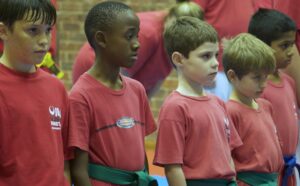
Things really changed when I became a parent myself.
During the last 20 years of teaching karate, I have been privileged to get to know thousands of children. I have gotten to know many wonderful parents and parenting styles. Things really changed when I became a parent myself. Amongst many things I have learned how enjoyable it is to see our children happy, I have also learned how hard it is to do things they don’t like. In addition, most of all, I have a burning desire for them to be happy, fulfilled humans, gaining the tools to handle what life throws at them.
At which point do we allow our children to quit and how much should we push them to carry on?
Apart from school, our children take part in many sporting and cultural activities. But why – because we want them to, or they want to, or others when them to? The question then eventually is: at which point do we allow our children to quit and how much should we push them to carry on? The answer, in my opinion, lies in a related question: which activity is best at building my child’s character and teaches life lessons best to enable them to become a happy, fulfilled and successful adult contributing to society? (Refer back to my points above on important life skills.)
It is important to set aside time to enjoy life and have fun, but it is equally important to guide our children away from short-term happiness and show them the way to long-term success and happiness.
Through the years of teaching karate and being involved in sport, I am convinced that there are many activities and sports that tick the boxes when it comes to child development. However, something to be cautious about is to over commit our children. Too many activities will leave our children simply too exhausted to grow. The last thing you want, is for your child putting in the effort with no progress (reward/s), being constantly exhausted will inhibit growth and life lessons to flower.
Tools for maximum development success.
The fortunate thing about karate and martial arts in general is that it provides a variety of tools for maximum development success. From experience, let me name my top 7 examples:
- Delayed gratification: Karate is a complex art. It takes on average 5 to 7 years for a child to get their black belt, but when you get it, it’s an overwhelming experience!
- Builds Confidence: Karate is an ancient martial art teaching to defend yourself physically and mentally. This builds confidence. With our children being victims of e.g. bullying, it is important that they can stand up for themselves, others and society.
- Grit, perseverance and consequence: Karate is a contact sport. If you do not block, you might be hit and that hurts (sometimes a lot)! You need to carry on, control your emotions and think clearly. To develop this you will need to train hard, develop strength, accuracy, reaction time and speed. In turn, this will develop confidence.
- Etiquette, respectful and ethical conduct: Japanese culture has a strong influence on karate until this day (some organizations more than others do). Most well-respected dojos follow a culture of etiquette, respect and strong ethics, the type of environment that is beneficial to a child’s life-long development.
- Social Skills: Much of karate training takes place in a group environment and often with a partner (not always of your choice). This develops social skills, working towards a common goal and encouraging one another. I have also noticed older members keeping one another accountable (e.g. if you miss a lesson you keep the group back).
- Intellect: There are many complex techniques to remember. This includes sequences with spatial awareness. One cannot achieve this without concentration. This ‘muscle’ gets a lot of practise in karate. For more experienced karate-ka strategizing becomes part of sparring, almost like a game of chess, adapting to the situation, deciding quickly how best to defeat your opponent and act. In a sparring match, during grading, a tournament or in practice, quick decision making under pressure and heightened emotions, becomes an important skill.
- Physical and mental well-being: Growing up and as we get older, we realise how important an active life-style is. Keeping fit, flexible and strong will contribute to our overall well-being when young and will be in good stead when growing older. Karate certainly helps calm the mind by getting rid of frustration. As you start practicing karate for a lengthy period you realise how much you still need to learn, I guess this is why you see so many older karate-ka still practising, it keeps your mind curious, alert and in ‘learning’ mode.
Character is built on pushing through the hard and uncomfortable times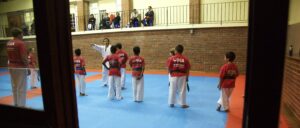
Character is one word that summarises most of the above life lessons. Character is built on pushing through the hard and uncomfortable times; sticking with what you started even though, it is not fun. Character is built through doing the right things right – this includes putting others first when it is inconvenient. Character is not built through having fun and things being easy all the time.
I have a number of examples of students that wanted to quit karate but was not allowed to. Seven years later these students love karate and turned into thriving young adults – one day they will thank their parents showing them the way.

